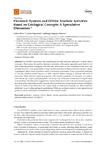Mostrar o rexistro simple do ítem
Electronic Systems and Offsite Touristic Activities Based on Geological Concepts: A Speculative Discussion
| dc.contributor.author | Alves, Carlos | |
| dc.contributor.author | Figueiredo, Carlos Alberto Machado | |
| dc.contributor.author | Sanjurjo-Sánchez, Jorge | |
| dc.date.accessioned | 2021-04-09T11:12:10Z | |
| dc.date.available | 2021-04-09T11:12:10Z | |
| dc.date.issued | 2020-10-30 | |
| dc.identifier.citation | Alves, C.; Figueiredo, C.; Sanjurjo-Sánchez, J. Electronic Systems and Offsite Touristic Activities Based on Geological Concepts: A Speculative Discussion. Eng. Proc. 2020, 3, 4. https://doi.org/10.3390/IEC2020-06969 | es_ES |
| dc.identifier.issn | 2673-4591 | |
| dc.identifier.uri | http://hdl.handle.net/2183/27696 | |
| dc.description.abstract | [Abstract] The COVID-19 pandemic has caused havoc in many economic areas such as those related to tourism. This creates the need for alternative activities in this sector, especially given that it is not clear when the present emergency will end and there could be new situations of this kind. We consider here two main possibilities (virtual models and remote observations) for tourism related to geological objects (including those used by humans) and processes. These approaches could help to promote remote-operated tourism in other celestial bodies, helping to promote this kind of enterprise. These activities could be prepared with variable connection to education (for publics with diverse age ranges), prompting their use at any time of the year (hence minimizing the issue of seasonality). Our discussion suggests that remote observations will be the most interesting option since they could potentially give the users an unlimited diversity of experiences, it might give higher returns to local communities (but also higher loads on local environments) and they could find additional value in other geological applications. While our analysis is certainly very speculative at present, it can be submitted to falsification by the financial results. | es_ES |
| dc.description.sponsorship | Portugal. Fundação para a Ciência e a Tecnologia; FCT-UIDB/04509/2020 | es_ES |
| dc.description.sponsorship | Portugal. Fundação para a Ciência e a Tecnologia; FCT-UIDB/04028/2020 | es_ES |
| dc.description.sponsorship | Xunta de Galicia; ED431B 2018/47 | es_ES |
| dc.description.sponsorship | Xunta de Galicia; R2017/008 | es_ES |
| dc.language.iso | eng | es_ES |
| dc.publisher | MDPI | es_ES |
| dc.relation.uri | https://doi.org/10.3390/IEC2020-06969 | es_ES |
| dc.rights | Atribución 4.0 Internacional | es_ES |
| dc.rights.uri | http://creativecommons.org/licenses/by/4.0/ | * |
| dc.subject | Geological systems | es_ES |
| dc.subject | Virtual objects | es_ES |
| dc.subject | Remote operations | es_ES |
| dc.subject | Education | es_ES |
| dc.subject | Built environment | es_ES |
| dc.subject | Celestial bodies | es_ES |
| dc.subject | SpaceX | es_ES |
| dc.subject | COVID-19 | es_ES |
| dc.title | Electronic Systems and Offsite Touristic Activities Based on Geological Concepts: A Speculative Discussion | es_ES |
| dc.type | info:eu-repo/semantics/conferenceObject | es_ES |
| dc.rights.access | info:eu-repo/semantics/openAccess | es_ES |
| UDC.journalTitle | Engineering Proceedings | es_ES |
| UDC.volume | 3 | es_ES |
| UDC.issue | 1 | es_ES |
| UDC.startPage | 4 | es_ES |
| UDC.conferenceTitle | 1st International Electronic Conference—Futuristic Applications on Electronics, 1–30 November 2020 | es_ES |






